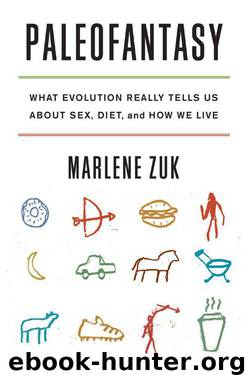Paleofantasy: What Evolution Really Tells Us about Sex, Diet, and How We Live by Zuk Marlene

Author:Zuk, Marlene [Zuk, Marlene]
Language: eng
Format: epub
Publisher: Norton
Published: 2013-03-17T22:00:00+00:00
(© Kim Warp/The New Yorker Collection/www.cartoonbank.com)
On Cavemanforum.com, readers chime in:
It’s actually also true than [sic] girls are more likely to settle for the less alpha-type guys, but if they are going to cheat they do it with the more macho guys. We’re biologically wired that way. Blame evolution.4
The paleo norm was for less than half the men to reproduce. Having 80–90% of men reproduce is a very recent phenomenon (even closer in time than agriculture). Lifetime Monogamy is as artificial as bread or corn syrup.5
What all of these views have in common is an evolutionary perspective. They seek to explain our modern behavior in terms of our past, recognizing that how we mate and have babies is at the heart of who we are. Sex is the way in which we can seem most like our animal ancestors and relatives; all creatures reproduce in some fashion, and we obviously are descended from primates that chose mates, gave birth, and raised their children. What is not so clear is how they did it, and by extension what behaviors and roles we have inherited from our ancestors.
Perhaps not surprisingly, many of the paleo-lifestyle advocates point wistfully to a time when “sex was a lot more egalitarian and promiscuous than you’d think it was.”6 One woman confessed that, since eating a paleo diet, “I’m VERY attracted to more aggressive (but still respectful), more capable men, strong of intellect and body, physically larger, hair on their chests, who would make good protectors and providers—not so much financially, but in the home.”7 Exactly how a change in diet leads to a preference for more hirsute partners is not clear.
We may not really believe that men are from Mars and women from Venus, but we have a lot of opinions about what each sex can do or is likely to enjoy, from reading maps to watching tearjerker movies. Men and women are often supposed to differ even more in their sexuality, whether that means the kind of partner they want, their sexual appetites, or what they think a good marriage looks like. Evolution has been invoked to explain all of these characteristics—maybe not the movies per se, but supposed sex differences in traits, ranging from the capacity to appreciate nuances in relationships or have empathy for the travails of others, to the ability to perform spatial reasoning tasks, to a love of shopping for shoes, have been attributed to our history as hunter-gatherers.
As with the question regarding other aspects of human behavior, however, how much do we know about the sex lives of our ancestors? And how much of that behavior is still manifested today, in a world with speed dating and sperm banks? Is it instructive to look at our ancestry, or will we simply see what we want to see?
Darwin, peacocks, and pipefish
To understand the evolutionary basis for sex differences, we need to pay a brief visit to Charles Darwin. Although he is best known for his theory of natural selection as it applies to the origin and diversity of species on Earth, Darwin was also extremely interested in sex.
Download
This site does not store any files on its server. We only index and link to content provided by other sites. Please contact the content providers to delete copyright contents if any and email us, we'll remove relevant links or contents immediately.
The Leavers by Lisa Ko(6502)
Born to Run: by Christopher McDougall(6292)
iGen by Jean M. Twenge(4712)
Sapiens by Yuval Noah Harari(4567)
The Kite Runner by Khaled Hosseini(4495)
Spare by Prince Harry The Duke of Sussex(4237)
Bullshit Jobs by David Graeber(3196)
Livewired by David Eagleman(3146)
Goodbye Paradise(2989)
Never by Ken Follett(2923)
A Dictionary of Sociology by Unknown(2525)
Harry Potter 4 - Harry Potter and The Goblet of Fire by J.K.Rowling(2424)
The Club by A.L. Brooks(2389)
People of the Earth: An Introduction to World Prehistory by Dr. Brian Fagan & Nadia Durrani(2356)
Machine Learning at Scale with H2O by Gregory Keys | David Whiting(2335)
The Social Psychology of Inequality by Unknown(2324)
Harry Potter and the Order of the Phoenix (5) by J.K. Rowling(2246)
Harry Potter and the Deathly Hallows (7) by J.K. Rowling(2241)
0041152001443424520 .pdf by Unknown(2233)
